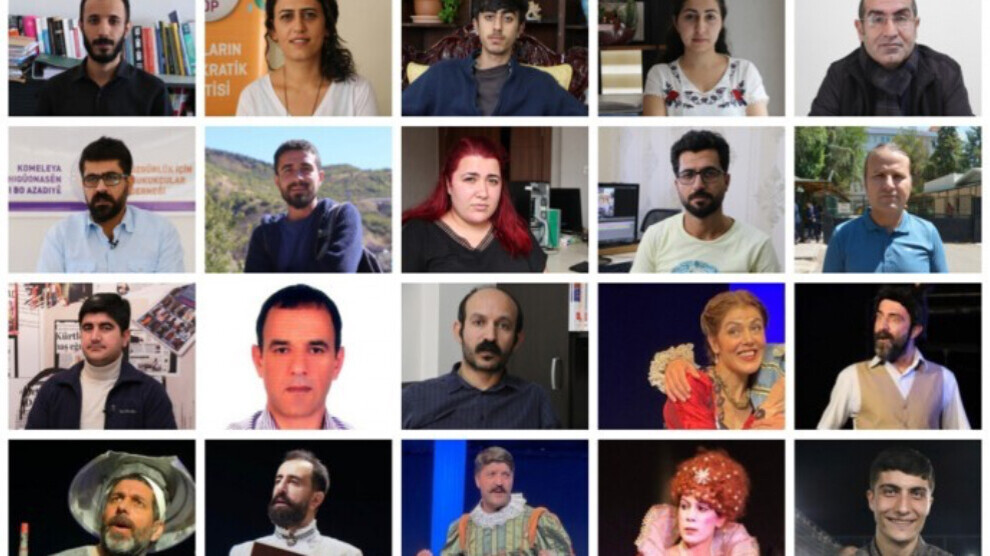Amnesty International calls for the release of five journalists in Kurdistan Region. Reactions are growing to the latest arrest of 5 journalists and activists from Behdinan by the KDP which already holds nearly 50 journalists behind bars in southern Kurdistan, northern Iraq.
On 16 February, the 2nd Erbil (Hewler) Criminal Court, in the Kurdish Region of Iraq’s capital, sentenced activists and journalists Sherwan Sherwani, Ghudar Zebari, Hussein Issa, Ayaz Karan and Shvan Saeed to six years in prison following an unfair trial, based on trumped-up charges of “destabilizing the security and stability of the Kurdistan Region of Iraq (KR-I)”.
As the five journalists are now on hunger strike as they await the appeal verdict expected to take place by 16 March, Amnesty International called for their immediate and unconditional release in a letter written to Dr. Dindar Zebari, KRG Coordinator Office for International Advocacy (OCIA).
Since their sentencing, the five journalists have been on hunger strike to protest their detention conditions. According to information available to Amnesty International, they are detained in overcrowded cells with no room to sleep, stand or walk, together with over 100 prisoners. In such conditions, the journalists and other detainees are particularly vulnerable to the spread of COVID-19.
Members of the Kurdish security forces [otherwise known as Asayish] arrested Sherwan Sherwani on 7 October 2020 in Erbil, the Kurdistan Region of Iraq’s capital, and the other 4 journalists- Guhdar Zebari, Hariwan Issa, Ayaz Karam and Shvan Saeed – on 22 October 2020 in Duhok, another main city in the KRG, in relation to their involvement in anti-government protests over unpaid wages and corruption. Throughout their detention, the five journalists were forcibly disappeared, some for more than three months. They had very limited access to their lawyers and family members. The five journalists told either their lawyers or family members that they had been subjected to torture and other ill-treatment. During the court hearing, all five journalists said that they had been forced to sign “confessions” under duress, but the court dismissed those claims. In addition, the hearing was held in closed session, as security forces barred the entrance, including to immediate family members.
Concerning the background of the arrest of the five Kurdish journalists, Amnesty International reported the following; Members of the Kurdish security forces [otherwise known as Asayish] arrested Sherwan Sherwani on 7 October 2020 in Erbil, the Kurdistan Region of Iraq’s capital, and the other 4 journalists- Guhdar Zebari, Hariwan Issa, Ayaz Karam and Shvan Saeed – on 22 October 2020 in Duhok, another main city in the KRG, in relation to their involvement in anti-government protests over unpaid wages and corruption. Throughout their detention, the five journalists were forcibly disappeared, some for more than three months. They had very limited access to their lawyers and family members. The five journalists told either their lawyers or family members that they had been subjected to torture and other ill-treatment. During the court hearing, all five journalists said that they had been forced to sign confessions” under duress, but the court dismissed those claims. In addition, the hearing was held in closed session, as security forces barred the entrance, including to immediate family members.
“In light of the above, I urge you to immediately and unconditionally release Sherwan Sherwani, Guhdar Zebari, Hariwan Issa, Ayaz Karam and Shvan Saeed, immediately take all steps to ensure their unjust conviction is overturned, and ensure a prompt and effective investigation into the allegations of torture and other ill-treatment with a view to holding perpetrators accountable and providing redress to them. Pending their release, I further urge you to ensure they have access to qualified health professionals providing health care in compliance with medical ethics, including the principles of confidentiality, autonomy, and informed consent and has unfettered access to their lawyers and family,” wrote Amnesty International in its letter to KRG Coordinator Office for International Advocacy.
Amnesty International called on people to write an appeal in their own words or use the model letter, which can be found here https://www.amnesty.org/en/documents/mde14/3754/2021/en/


